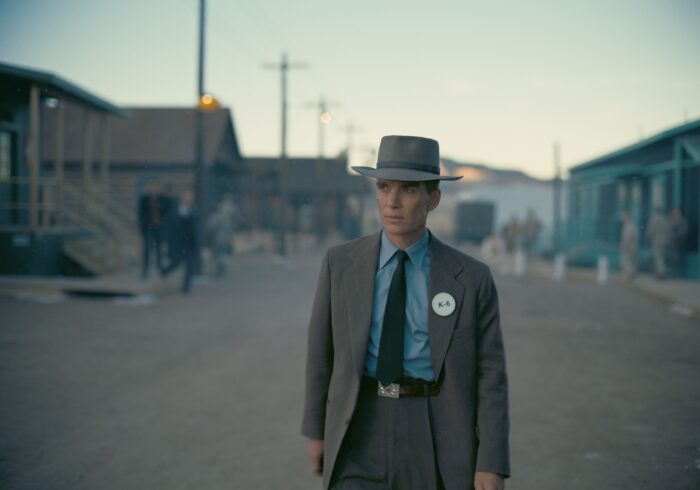Oppenheimer: A towering achievement
Review Overview
Cast
9Visuals
9Trauma
9David Farnor | On 01, Jan 2024
Director: Christopher Nolan
Cast: Cillian Murphy, Matt Damon, Robert Downey Jr, Emily Blunt, Florence Pugh
Certificate: 15
When is a biopic not a biopic? In Christopher Nolan’s hands, that question almost diminishes into insignificance, as do most other things. His Oppenheimer is a towering, intimdating, awe-inspiring piece of cinema, something that is overwhelming big in its scope, scale and stakes.
The film tells the story of J Robert Oppenheimer (Cillian Murphy), the physicist who ultimately invented the atomic bomb. But rather than simply follow his life from start to end, Nolan’s script goes much bigger, simultaneously focusing on the birth of the Manhattan Project, leading up to the Trinity nuclear test in New Mexico in 1945, and then putting that in wider historical context – through the lens of both a 1954 private hearing to question Oppenheimer’s security clearance, given his past ties to the Communist Party, and a 1959 Senate hearing vetting Oppenheimer’s former colleague, politican Lewis Strauss (Robert Downey Jr), before his appointment to the White House.
Flashbacks throughout the first hearing take us back to Oppenheimer’s younger years, as he crosses paths with a number of notable figures – including the inspiring Neils Bohr (Kenneth Branagh) and the enigmatic Albert Einstein (Tom Conti). Oppenheimer cuts a withdrawn, awkward figure, driven by advancing science to the point of all-consuming obsession – he’s closer to a poet than a mathematician. One striking moment sees him almost poison his supervisor (James D’Arcy) – a foreshadowing of the potential for both his psychological detachment and unintentionally deadly actions.
The assembly of the Manhattan Project is the most enthralling part of the mosaic, playing out like a clockwork heist overseen by the impatient Lieut-General Leslie Groves (an excellently understated Matt Damon), with Strauss in the wings as the Atomic Energy Commission chairman. It’s a colossal undertaking, with an expansive ensemble cast (all uniformly superb) that bubble with tensions, excitement, hopes and suspicions.
The actual test detonation is mounted by Nolan like a blockbuster set piece, even though it mostly involves people sitting quietly as numbers tick and wires click into place. It’s perhaps the most nerve-wracking sequence of 2023, with a masterful use of sound and silence to depict the daunting horror of what’s unfolding. It’s rivalled only by the scene when Oppenheimer has to address his troops and congratulate them – all the while haunted by the screams of those killed by and dying after the dropping of the bomb on Hiroshima.
Ludwig Göransson’s incredbile soundtrack incorporates the stomping feet of the celebrating audience and propulsively propels us into the ephemeral, abstract sphere of nuclear fission – he and Nolan work seamlessly to capture the inner workings of Opeenheimer’s mind as it races to solve a problem that, once calculated, continues to reverberate long after. The decision to cut between all these elements concurrently fuses the portent of the horror on the horizon with the trauma of the power unleashed – a knowledge that somehow is both unknown and forever anticipated, with the physical fabric of the movie seeming to shake with the weight of it.
The non-linear structure also makes the parts of the two women in Oppenheimer’s life seem more substantial than they perhaps are on the page. Florence Pugh is excellent as his lover, Jean, whose heartbroken fate stays with him, while Emily Blunt is excellently tough as his poorly treated wife, Kitty, who steals several scenes during the hearing just by sitting to the side and smoking furiously.
Also giving strong support is an unrecognisable Robert Downey Jr as the petty Strauss, whose courtroom drama-esque antics at first seem like a distraction but ultimately highlight Oppenheimer’s fleeting role on America’s political chessboard. While he is initially a celebrity for his ability to unlock a power beyond comprehension, he’s then a semi-disgraced figure who can’t achieve his aim of post-war atomic control. An encounter with President Truman (Gary Oldman) drives home Oppenheimer’s significance and, in the face of history and humankind’s capability of destroying itself, individual insignificance – we see him almost shrink before the President, who can’t understand why this scientist is taking on responsibility for something that he sees as sitting on his own shoulders.
At the heart of it all is the astonishing Cillian Murphy, who delivers a career-best turn as a man haunted by premonitions as much as PTSD. The weight of it all is vividly, visibly portrayed by Murphy, who has never been a more imposing or more slight screen presence. His gaunt face is dwarfed by a legacy that Nolan’s film expands to unwieldy lengths to try and capture, even as it remains a resolutely psychological drama that internalises its fears. All the while, the camera zooms in close on his blue eyes – a piercing look that stares into the distance, looking at an apocalyptic future even as he endlessly replays the past.

















